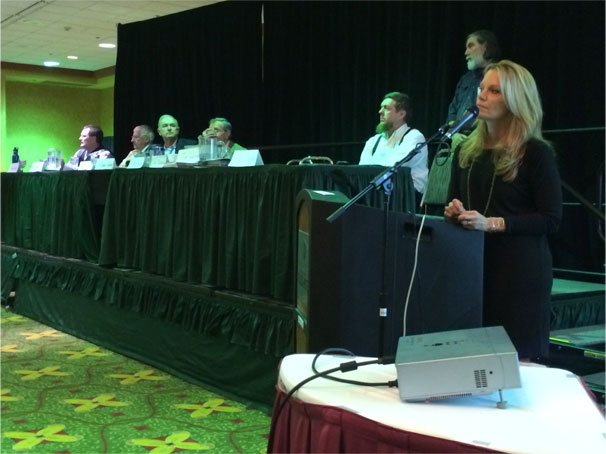
Robyn O’Brien was one of nine speakers at the GMO Plenary held at the Missouri Organic Conference in February
Expert GMO panel—held in Monsanto’s home state— speaks out about GM food, glyphosate dangers
Scientists, crop advisors, and educators highlight GMO risks from all sides
A “GMO Plenary” recently held in Missouri featured a panel of experts who discussed multiple health and environmental risks with genetically modified crops and foods and glyphosate herbicide.
The plenary, which was held at the Missouri Organic Conference in February in Springfield, Missouri, featured scientists, crop advisors, farmers, and educators.
Conference organizer Sue Baird said the plenary was purposely held in Missouri as a counterweight to the pro-GMO influence of St. Louis-based biotech giant Monsanto.
“Greatest civil rights issue of our time”
Plenary speakers attacked GMOs from all sides—from negative health and environmental impacts, spiritual implications, and FDA’s illegal GM food regulation to the lawsuit threat to farmers by Monsanto, GMO contamination of organics, lack of GMO labeling, and non-GMO market growth.Keynote speaker and food advocate Robyn O’Brien described how she became involved in the GM food fight after her youngest daughter suffered a life-threatening allergic reaction to a food product.
“Are we allergic to food or what’s been done to it?” she asked.
O’Brien cited statistics showing alarming rates of food allergies, autism, asthma, and cancer in children. She correlated the rise in these diseases to the introduction of GMOs in foods.
“Correlation is not causation, but correlation of this magnitude demands investigation,” she said.
O’Brien called for mandatory GMO labeling. “Sixty percent of the world’s population is told (whether GMOs are in food), but in the US we have never been given that information,” she said.
O’Brien said the exploding demand for organic food indicates that a “food awakening” is happening in the US.
She called for everyone to work together on what she described as “the greatest civil rights issue of our time.”
“Together we are so powerful,” O’Brien said.
“GM foods should be banned and the technology stopped”
Steven Druker, an attorney and executive director of the Alliance for Bio-Integrity, lambasted pro-GMO scientists, the biotech industry, and the US Food and Drug Administration, saying GM foods are not safe and are on the market illegally.He discussed the L-tryptophan disaster in the late 1980s, when dozens of people died and hundreds maimed after consuming a GM version of the supplement.
“It’s more likely than not that genetic engineering caused the toxic contamination that led to the deaths and illnesses,” said Druker, author of a hard-hitting new book about GMOs, Altered Genes, and Twisted Truth.
Druker said the FDA is violating its own policy on food additives, which states that additives developed through new technologies must be proven safe before they enter the market.
“This food had no business going to market,” he said.
GM foods, Druker argued, haven’t been proven safe, are produced using a “reckless” technology, and the agency’s own scientists raised alarms about their safety in the early 1990s.
“Government scientists raised concerns but they were ignored,” said Druker, who gained access to internal FDA documents revealing agency scientists’ objections to GM technology during his lawsuit against the agency.
As a result, Druker said: “These foods should be banned, and the technology should be stopped. It’s time to tell the truth.”
Glyphosate dangers
Robert Kremer, a microbiologist with the University of Missouri, discussed negative environmental risks with both GM crops and glyphosate herbicide, which is used extensively with the crops.He said that GM seeds are “inherently weak,” citing an example of GM seed that had a germination rate of just 5% after being stored for two years compared to 75% for conventional seed stored for the same amount of time.
Kremer listed a range of negative impacts from glyphosate herbicide, including harm to beneficial soil microbes, increase of soil pathogens such as fusarium fungal toxins, and immobilization of nutrients such as manganese.
“Glyphosate creates a proliferation of pathogens in the soil,” he said.
Kremer criticized the biotech industry’s “solution” to weed resistance to glyphosate, which are new GM crops that work with 2,4-D and dicamba herbicides.
“2,4-D and dicamba resistant crops may make plants more susceptible to disease. This obviously won’t be a sustainable approach,” he said.
Finally, Kremer said “Food should be produced in a way that enhances environmental quality. It is in our interest to educate consumers about how GM crops and the use of glyphosate may impact agricultural production systems to develop an awareness of how our food is produced and how food quality might be affected.”
Glyphosate found everywhere
Iowa farmer and crop consultant Howard Vlieger also focused on harm caused by glyphosate. He said the herbicide is everywhere—in the air, waterways, and rain—according to the US Geological Survey. It’s also found in many food crops and foods, such as Froot Loops cereal.“What will it take to wake people up?” he asked. “You and I.”
Agronomist Michael McNeil discussed the “shot in the dark” approach of genetic engineering that can cause harmful unintended consequences to other genes.
“The industry tells us ‘we insert one gene and it doesn’t change much,’ but it does,” he said.
Jim Gerritsen, organic farmer and president of the Organic Seed Growers Trade Association, discussed the lawsuit his group filed against Monsanto to prevent the company from suing farmers whose crops are accidentally contaminated by the company’s patented GMOs.
Ken Roseboro, editor of The Organic & Non-GMO Report, highlighted the exploding demand for non-GMO foods spurred by companies such as Whole Foods, Ben & Jerry’s, and Chipotle.
© Copyright The Organic & Non-GMO Report, March 2015
By Ken Roseboro
Published: February 26, 2015
Published: February 26, 2015
SOURCE: http://www.non-gmoreport.com/articles/march-2015/expert-gmo-panel-held-in-Monsanto-%20home-state-gm-food-glyphosate-dangers.php PLEASE: Visit the Non-GMOREPORT website, sign up for their newsletter and STAY INFORMED!